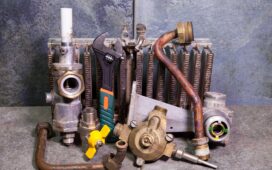From food production and storage to chemical processes and pharmaceuticals, industrial refrigeration plays a pivotal role in a wide range of industries. In this blog, we will explore the world of industrial refrigeration equipment, its importance, and its diverse applications.
Understanding industrial refrigeration equipment
Industrial refrigeration equipment encompasses a wide array of machinery and systems designed to create and maintain cold temperatures within industrial settings. Unlike domestic refrigeration units, industrial refrigeration systems are larger, more powerful, and built to withstand heavy-duty usage. They consist of various components and technologies tailored to meet specific industry requirements.
Key components of industrial refrigeration equipment
- Compressors: Compressors are the heart of any refrigeration system. They are responsible for compressing and circulating the refrigerant, creating the necessary temperature differential for cooling. Common types of compressors include reciprocating, screw, and centrifugal compressors.
- Condensers: Condensers release heat from the refrigerant, causing it to condense from a gas to a liquid state. This process is crucial for maintaining the desired low temperatures inside the refrigeration system.
- Evaporators: Evaporators absorb heat from the surrounding environment, causing the refrigerant to evaporate and return to its gaseous state. This is where the cooling effect takes place, and it’s essential for preserving products or materials.
- Expansion devices: Expansion devices regulate the flow of refrigerant, allowing it to expand and cool rapidly as it enters the evaporator. Common types include expansion valves and capillary tubes.
Applications across industries
Industrial refrigeration equipment plays a vital role in various industries, ensuring product quality, safety, and energy efficiency. Here are some key sectors where industrial refrigeration is indispensable:
- Food and beverage: Industrial refrigeration is critical for food processing, storage, and distribution. It helps maintain the freshness and safety of perishable goods, including meat, dairy products, fruits, and vegetables.
- Chemical and petrochemical: In chemical and petrochemical industries, refrigeration equipment is used for cooling and condensing processes. It aids in liquefying gases, separating components, and controlling temperatures during chemical reactions.
- Pharmaceuticals: Pharmaceutical companies rely on precise temperature control to store and transport medications, vaccines, and biologics. Industrial refrigeration ensures the integrity and efficacy of these sensitive products.
- Cold storage and warehousing: Refrigerated warehouses and cold storage facilities are essential for preserving frozen and chilled products, from ice cream and seafood to floral arrangements.
- Brewing and beverage production: Breweries and beverage manufacturers use industrial refrigeration equipment to control fermentation temperatures and chill beverages before packaging.
- Energy and power generation: Power plants and energy facilities use refrigeration for cooling processes and equipment, such as gas turbines and steam condensers.
- Data centers: Data centers rely on industrial refrigeration to maintain optimal temperatures for servers and IT equipment, ensuring uninterrupted operation.
Conclusion
Industrial refrigeration equipment is the unsung hero of various industries, providing the essential cooling needed to preserve products, enable chemical processes, and maintain operational efficiency. From compressors and condensers to evaporators and expansion devices, these systems are the backbone of many businesses, ensuring that products remain fresh, safe, and efficient. As industries continue to advance, so does the technology and efficiency of industrial refrigeration equipment, further solidifying its importance in our modern world.







